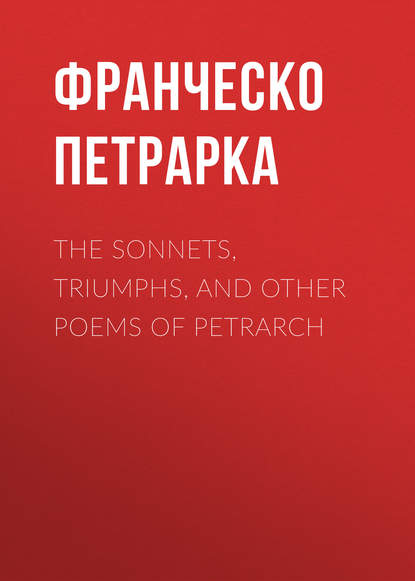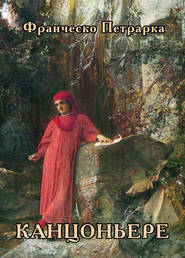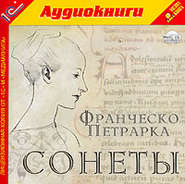По всем вопросам обращайтесь на: info@litportal.ru
(©) 2003-2025.
✖
The Sonnets, Triumphs, and Other Poems of Petrarch
Настройки чтения
Размер шрифта
Высота строк
Поля
The superior and the elders among the friars thought it a meet fate for the accused that he should be buried alive in a subterranean dungeon, after receiving the terrific sentence of "Vade in pace." At the end of several days the victim dashed out his brains against the walls of his sepulchre. Bishop Colonna, who, it would appear, had no power to oppose this hideous transaction, when he was informed of it, determined to leave the place immediately; and Petrarch in his indignation exclaimed—
"Heu! fuge crudeles terras, fuge littus avarum."—Virg.
On the 26th of May, 1330, the Bishop of Lombes and Petrarch quitted Toulouse, and arrived at the mansion of the diocese. Lombes—in Latin, Lombarium—lies at the foot of the Pyrenees, only eight leagues from Toulouse. It is small and ill-built, and offers no allurement to the curiosity of the traveller. Till lately it had been a simple abbey of the Augustine monks. The whole of the clergy of the little city, singing psalms, issued out of Lombes to meet their new pastor, who, under a rich canopy, was conducted to the principal church, and there, in his episcopal robes, blessed the people, and delivered an eloquent discourse. Petrarch beheld with admiration the dignified behaviour of the youthful prelate. James Colonna, though accustomed to the wealth and luxury of Rome, came to the Pyrenean rocks with a pleased countenance. "His aspect," says Petrarch, "made it seem as if Italy had been transported into Gascony." Nothing is more beautiful than the patient endurance of our destiny; yet there are many priests who would suffer translation to a well-paid, though mountainous bishopric, with patience and piety.
The vicinity of the Pyrenees renders the climate of Lombes very severe; and the character and conversation of the inhabitants were scarcely more genial than their climate. But Petrarch found in the bishop's abode friends who consoled him in this exile among the Lombesians. Two young and familiar inmates of the Bishop's house attracted and returned his attachment. The first of these was Lello di Stefani, a youth of a noble and ancient family in Rome, long attached to the Colonnas. Lello's gifted understanding was improved by study; so Petrarch tells us; and he could have been no ordinary man whom our accomplished poet so highly valued. In his youth he had quitted his studies for the profession of arms; but the return of peace restored him to his literary pursuits. Such was the attachment between Petrarch and Lello, that Petrarch gave him the name of Lælius, the most attached companion of Scipio. The other friend to whom Petrarch attached himself in the house of James Colonna was a young German, extremely accomplished in music. De Sade says that his name was Louis, without mentioning his cognomen. He was a native of Ham, near Bois le Duc, on the left bank of the Rhine between Brabant and Holland. Petrarch, with his Italian prejudices, regarded him as a barbarian by birth; but he was so fascinated by his serene temper and strong judgment, that he singled him out to be the chief of all his friends, and gave him the name of Socrates, noting him as an example that Nature can sometimes produce geniuses in the most unpropitious regions.
After having passed the summer of 1330 at Lombes, the Bishop returned to Avignon, in order to meet his father, the elder Stefano Colonna, and his brother the Cardinal.
The Colonnas were a family of the first distinction in modern Italy. They had been exceedingly powerful during the popedom of Boniface VIII., through the talents of the late Cardinal James Colonna, brother of the famous old Stefano, so well known to Petrarch, and whom he used to call a phœnix sprung up from the ashes of Rome. Their house possessed also an influential public character in the Cardinal Pietro, brother of the younger Stefano. They were formidable from the territories and castles which they possessed, and by their alliance and friendship with Charles, King of Naples. The power of the Colonna family became offensive to Boniface, who, besides, hated the two Cardinals for having opposed the renunciation of Celestine V., which Boniface had fraudulently obtained. Boniface procured a crusade against them. They were beaten, expelled from their castles, and almost exterminated; they implored peace, but in vain; they were driven from Rome, and obliged to seek refuge, some in Sicily and others in France. During the time of their exile, Boniface proclaimed it a capital crime to give shelter to any of them.
The Colonnas finally returned to their dignities and property, and afterwards made successful war against the house of their rivals, the Orsini.
John Colonna, the Cardinal, brother of the Bishop of Lombes, and son of old Stefano, was one of the very ablest men at the papal court. He insisted on our poet taking up his abode in his own palace at Avignon. "What good fortune was this for me!" says Petrarch. "This great man never made me feel that he was my superior in station. He was like a father or an indulgent brother; and I lived in his house as if it had been my own." At a subsequent period, we find him on somewhat cooler terms with John Colonna, and complaining that his domestic dependence had, by length of time, become wearisome to him. But great allowance is to be made for such apparent inconsistencies in human attachment. At different times our feelings and language on any subject may be different without being insincere. The truth seems to be that Petrarch looked forward to the friendship of the Colonnas for promotion, which he either received scantily, or not at all; so it is little marvellous if he should have at last felt the tedium of patronage.
For the present, however, this home was completely to Petrarch's taste. It was the rendezvous of all strangers distinguished by their knowledge and talents, whom the papal court attracted to Avignon, which was now the great centre of all political negotiations.
This assemblage of the learned had a powerful influence on Petrarch's fine imagination. He had been engaged for some time in the perusal of Livy, and his enthusiasm for ancient Rome was heightened, if possible, by the conversation of old Stefano Colonna, who dwelt on no subject with so much interest as on the temples and palaces of the ancient city, majestic even in their ruins.
During the bitter persecution raised against his family by Boniface VIII., Stefano Colonna had been the chief object of the Pope's implacable resentment. Though oppressed by the most adverse circumstances, his estates confiscated, his palaces levelled with the ground, and himself driven into exile, the majesty of his appearance, and the magnanimity of his character, attracted the respect of strangers wherever he went. He had the air of a sovereign prince rather than of an exile, and commanded more regard than monarchs in the height of their ostentation.
In the picture of his times, Stefano makes a noble and commanding figure. If the reader, however, happens to search into that period of Italian history, he will find many facts to cool the romance of his imagination respecting all the Colonna family. They were, in plain truth, an oppressive aristocratic family. The portion of Italy which they and their tyrannical rivals possessed was infamously governed. The highways were rendered impassable by banditti, who were in the pay of contesting feudal lords; and life and property were everywhere insecure.
Stefano, nevertheless, seems to have been a man formed for better times. He improved in the school of misfortune—the serenity of his temper remained unclouded by adversity, and his faculties unimpaired by age.
Among the illustrious strangers who came to Avignon at this time was our countryman, Richard de Bury, then accounted the most learned man of England. He arrived at Avignon in 1331, having been sent to the Pope by Edward III. De Sade conceives that the object of his embassy was to justify his sovereign before the Pontiff for having confined the Queen-mother in the castle of Risings, and for having caused her favourite, Roger de Mortimer, to be hanged. It was a matter of course that so illustrious a stranger as Richard de Bury should be received with distinction by Cardinal Colonna. Petrarch eagerly seized the opportunity of forming his acquaintance, confident that De Bury could give him valuable information on many points of geography and history. They had several conversations. Petrarch tells us that he entreated the learned Englishman to make him acquainted with the true situation of the isle of Thule, of which the ancients speak with much uncertainty, but which their best geographers place at the distance of some days' navigation from the north of England. De Bury was, in all probability, puzzled with the question, though he did not like to confess his ignorance. He excused himself by promising to inquire into the subject as soon as he should get back to his books in England, and to write to him the best information he could afford. It does not appear, however, that he performed his promise.
De Bury's stay at the court of Avignon was very short. King Edward, it is true, sent him a second time to the Pope, two years afterwards, on important business. The seeds of discord between France and England began to germinate strongly, and that circumstance probably occasioned De Bury's second mission. Unfortunately, however, Petrarch could not avail himself of his return so as to have further interviews with the English scholar. Petrarch wrote repeatedly to De Bury for his promised explanations respecting Thule; but, whether our countryman had found nothing in his library to satisfy his inquiries, or was prevented by his public occupations, there is no appearance of his having ever answered Petrarch's letters.
Stephano Colonna the younger had brought with him to Avignon his son Agapito, who was destined for the church, that he might be educated under the eyes of the Cardinal and the Bishop, who were his uncles. These two prelates joined with their father in entreating Petrarch to undertake the superintendence of Agapito's studies. Our poet, avaricious of his time, and jealous of his independence, was at first reluctant to undertake the charge; but, from his attachment to the family, at last accepted it. De Sade tells us that Petrarch was not successful in the young man's education; and, from a natural partiality for the hero of his biography, lays the blame on his pupil. At the same time he acknowledges that a man with poetry in his head and love in his heart was not the most proper mentor in the world for a youth who was to be educated for the church. At this time, Petrarch's passion for Laura continued to haunt his peace with incessant violence. She had received him at first with good-humour and affability; but it was only while he set strict bounds to the expression of his attachment. He had not, however, sufficient self-command to comply with these terms. His constant assiduities, his eyes continually riveted upon her, and the wildness of his looks, convinced her of his inordinate attachment; her virtue took alarm; she retired whenever he approached her, and even covered her face with a veil whilst he was present, nor would she condescend to the slightest action or look that might seem to countenance his passion.
Petrarch complains of these severities in many of his melancholy sonnets. Meanwhile, if fame could have been a balm to love, he might have been happy. His reputation as a poet was increasing, and his compositions were read with universal approbation.
The next interesting event in our poet's life was a larger course of travels, which he took through the north of France, through Flanders, Brabant, and a part of Germany, subsequently to his tour in Languedoc. Petrarch mentions that he undertook this journey about the twenty-fifth year of his age. He was prompted to travel not only by his curiosity to observe men and manners, by his desire of seeing monuments of antiquity, and his hopes of discovering the MSS. of ancient authors, but also, we may believe, by his wish, if it were possible, to escape from himself, and to forget Laura.
From Paris Petrarch wrote as follows to Cardinal Colonna. "I have visited Paris, the capital of the whole kingdom of France. I entered it in the same state of mind that was felt by Apuleias when he visited Hypata, a city of Thessaly, celebrated for its magic, of which such wonderful things were related, looking again and again at every object, in solicitous suspense, to know whether all that he had heard of the far-famed place was true or false. Here I pass a great deal of time in observation, and, as the day is too short for my curiosity, I add the night. At last, it seems to me that, by long exploring, I have enabled myself to distinguish between the true and the false in what is related about Paris. But, as the subject would be too tedious for this occasion, I shall defer entering fully into particulars till I can do so vivâ voce. My impatience, however, impels me to sketch for you briefly a general idea of this so celebrated city, and of the character of its inhabitants.
"Paris, though always inferior to its fame, and much indebted to the lies of its own people, is undoubtedly a great city. To be sure I never saw a dirtier place, except Avignon. At the same time, its population contains the most learned of men, and it is like a great basket in which are collected the rarest fruits of every country. From the time that its university was founded, as they say by Alcuin, the teacher of Charlemagne, there has not been, to my knowledge, a single Parisian of any fame. The great luminaries of the university were all strangers; and, if the love of my country does not deceive me, they were chiefly Italians, such as Pietro Lombardo, Tomaso d'Aquino, Bonaventura, and many others.
"The character of the Parisians is very singular. There was a time when, from the ferocity of their manners, the French were reckoned barbarians. At present the case is wholly changed. A gay disposition, love of society, ease, and playfulness in conversation now characterize them. They seek every opportunity of distinguishing themselves; and make war against all cares with joking, laughing, singing, eating, and drinking. Prone, however, as they are to pleasure, they are not heroic in adversity. The French love their country and their countrymen; they censure with rigour the faults of other nations, but spread a proportionably thick veil over their own defects."
From Paris, Petrarch proceeded to Ghent, of which only he makes mention to the Cardinal, without noticing any of the towns that lie between. It is curious to find our poet out of humour with Flanders on account of the high price of wine, which was not an indigenous article. In the latter part of his life, Petrarch was certainly one of the most abstemious of men; but, at this period, it would seem that he drank good liquor enough to be concerned about its price.
From Ghent he passed on to Liege. "This city is distinguished," he says, "by the riches and the number of its clergy. As I had heard that excellent MSS. might be found there, I stopped in the place for some time. But is it not singular that in so considerable a place I had difficulty to procure ink enough to copy two orations of Cicero's, and the little that I could obtain was as yellow as saffron?"
Petrarch was received at most of the places he visited, and more particularly at Cologne, with marks of great respect; and he was agreeably surprised to find that his reputation had acquired him the partiality and acquaintance of several inhabitants. He was conducted by his new friends to the banks of the Rhine, where the inhabitants were engaged in the performance of a superstitious annual ceremony, which, for its singularity, deserves to be recorded.
"The banks of the river were crowded with a considerable number of women, their persons comely, and their dress elegant. This great concourse of people seemed to create no confusion. A number of these women, with cheerful countenances, crowned with flowers, bathed their hands and arms in the stream, and uttered, at the same time, some harmonious expressions in a language which I did not understand. I inquired into the cause of this ceremony, and was informed that it arose from a tradition among the people, and particularly among the women, that the impending calamities of the year were carried away by this ablution, and that blessings succeeded in their place. Hence this ceremony is annually renewed, and the ablution performed with unremitting diligence."
The ceremony being finished, Petrarch smiled at their superstition, and exclaimed, "O happy inhabitants of the Rhine, whose waters wash out your miseries, whilst neither the Po nor the Tiber can wash out ours! You transmit your evils to the Britons by means of this river, whilst we send off ours to the Illyrians and the Africans. It seems that our rivers have a slower course."
Petrarch shortened his excursion that he might return the sooner to Avignon, where the Bishop of Lombes had promised to await his return, and take him to Rome.
When he arrived at Lyons, however, he was informed that the Bishop had departed from Avignon for Rome. In the first paroxysm of his disappointment he wrote a letter to his friend, which portrays strongly affectionate feelings, but at the same time an irascible temper. When he came to Avignon, the Cardinal Colonna relieved him from his irritation by acquainting him with the real cause of his brother's departure. The flames of civil dissension had been kindled at Rome between the rival families of Colonna and Orsini. The latter had made great preparations to carry on the war with vigour. In this crisis of affairs, James Colonna had been summoned to Rome to support the interests of his family, and, by his courage and influence, to procure them the succour which they so much required.
Petrarch continued to reside at Avignon for several years after returning from his travels in France and Flanders. It does not appear from his sonnets, during those years, either that his passion for Laura had abated, or that she had given him any more encouragement than heretofore. But in the year 1334, an accident renewed the utmost tenderness of his affections. A terrible affliction visited the city of Avignon. The heat and the drought were so excessive that almost the whole of the common people went about naked to the waist, and, with frenzy and miserable cries, implored Heaven to put an end to their calamities. Persons of both sexes and of all ages had their bodies covered with scales, and changed their skins like serpents.
Laura's constitution was too delicate to resist this infectious malady, and her illness greatly alarmed Petrarch. One day he asked her physician how she was, and was told by him that her condition was very dangerous: on that occasion he composed the following sonnet:[5 - Quest' anima gentil che si disparte.—Sonnet xxiii.]—
This lovely spirit, if ordain'd to leave
Its mortal tenement before its time,
Heaven's fairest habitation shall receive
And welcome her to breathe its sweetest clime.
If she establish her abode between
Mars and the planet-star of Beauty's queen,
The sun will be obscured, so dense a cloud
Of spirits from adjacent stars will crowd
To gaze upon her beauty infinite.
Say that she fixes on a lower sphere,
Beneath the glorious sun, her beauty soon
Will dim the splendour of inferior stars—
Of Mars, of Venus, Mercury, and the Moon.
She'll choose not Mars, but higher place than Mars;
She will eclipse all planetary light,
And Jupiter himself will seem less bright.
I trust that I have enough to say in favour of Petrarch to satisfy his rational admirers; but I quote this sonnet as an example of the worst style of Petrarch's poetry. I make the English reader welcome to rate my power of translating it at the very lowest estimation. He cannot go much further down than myself in the scale of valuation, especially if he has Italian enough to know that the exquisite mechanical harmony of Petrarch's style is beyond my reach. It has been alleged that this sonnet shows how much the mind of Petrarch had been influenced by his Platonic studies; but if Plato had written poetry he would never have been so extravagant.
Petrarch, on his return from Germany, had found the old Pope, John XXII., intent on two speculations, to both of which he lent his enthusiastic aid. One of them was a futile attempt to renew the crusades, from which Europe had reposed for a hundred years. The other was the transfer of the holy seat to Rome. The execution of this plan, for which Petrarch sighed as if it were to bring about the millennium, and which was not accomplished by another Pope without embroiling him with his Cardinals, was nevertheless more practicable than capturing Jerusalem. We are told by several Italian writers that the aged Pontiff, moved by repeated entreaties from the Romans, as well as by the remorse of his conscience, thought seriously of effecting this restoration; but the sincerity of his intentions is made questionable by the fact that he never fixed himself at Rome. He wrote, it is true, to Rome in 1333, ordering his palaces and gardens to be repaired; but the troubles which continued to agitate the city were alleged by him as too alarming for his safety there, and he repaired to Bologna to wait for quieter times.
On both of the above subjects, namely, the insane crusades and the more feasible restoration of the papal court to Rome, Petrarch[Pg xxviii] wrote with devoted zeal; they are both alluded to in his twenty-second sonnet.
The death of John XXII. left the Cardinals divided into two great factions. The first was that of the French, at the head of which stood Cardinal Taillerand, son of the beautiful Brunissende de Foix, whose charms were supposed to have detained Pope Clement V. in France. The Italian Cardinals, who formed the opposite faction, had for their chief the Cardinal Colonna. The French party, being the more numerous, were, in some sort, masters of the election; they offered the tiara to Cardinal de Commenges, on condition that he would promise not to transfer the papal court to Rome. That prelate showed himself worthy of the dignity, by refusing to accept it on such terms.
To the surprise of the world, the choice of the conclave fell at last on James Founder, said to be the son of a baker at Savordun, who had been bred as a monk of Citeaux, and always wore the dress of the order. Hence he was called the White Cardinal. He was wholly unlike his portly predecessor John in figure and address, being small in stature, pale in complexion, and weak in voice. He expressed his own astonishment at the honour conferred on him, saying that they had elected an ass. If we may believe Petrarch, he did himself no injustice in likening himself to that quadruped; but our poet was somewhat harsh in his judgment of this Pontiff. He took the name of Benedict XII.
Shortly after his exaltation, Benedict received ambassadors from Rome, earnestly imploring him to bring back the sacred seat to their city; and Petrarch thought he could not serve the embassy better than by publishing a poem in Latin verse, exhibiting Rome in the character of a desolate matron imploring her husband to return to her. Benedict applauded the author of the epistle, but declined complying with its prayer. Instead of revisiting Italy, his Holiness ordered a magnificent and costly palace to be constructed for him at Avignon. Hitherto, it would seem that the Popes had lived in hired houses. In imitation of their Pontiff, the Cardinals set about building superb mansions, to the unbounded indignation of Petrarch, who saw in these new habitations not only a graceless and unchristian spirit of luxury, but a sure indication that their owners had no thoughts of removing to Rome.
In the January of the following year, Pope Benedict presented our poet with the canonicate of Lombes, with the expectancy of the first prebend which should become vacant. This preferment Petrarch is supposed to have owed to the influence of Cardinal Colonna.
The troubles which at this time agitated Italy drew to Avignon, in the year 1335, a personage who holds a pre-eminent interest in the life of Petrarch, namely, Azzo da Correggio, who was sent thither by the Scaligeri of Parma. The State of Parma had belonged originally to the popes; but two powerful families, the Rossis and the Correggios, had profited by the quarrels between the church and the empire to usurp the government, and during five-and-twenty years, Gilberto Correggio and Rolando Rossi alternately lost and won the sovereignty, till, at last, the confederate princes took the city, and conferred the government of it on Guido Correggio, the greatest enemy of the Rossis.
Gilbert Correggio left at his death a widow, the sister of Cane de la Scala, and four sons, Guido, Simone, Azzo, and Giovanni. It is only with Azzo that we are particularly concerned in the history of Petrarch.
Azzo was born in the year 1303, being thus a year older than our poet. Originally intended for the church, he preferred the sword to the crozier, and became a distinguished soldier. He married the daughter of Luigi Gonzagua, lord of Mantua. He was a man of bold original spirit, and so indefatigable that he acquired the name of Iron-foot. Nor was his energy merely physical; he read much, and forgot nothing—his memory was a library. Azzo's character, to be sure, even with allowance for turbulent times, is not invulnerable at all points to a rigid scrutiny; and, notwithstanding all the praises of Petrarch, who dedicated to him his Treatise on a Solitary Life in 1366, his political career contained some acts of perfidy. But we must inure ourselves, in the biography of Petrarch, to his over-estimation of favourites in the article of morals.
It was not long ere Petrarch was called upon to give a substantial proof of his regard for Azzo. After the seizure of Parma by the confederate princes, Marsilio di Rossi, brother of Rolando, went to Paris to demand assistance from the French king. The King of Bohemia had given over the government of Parma to him and his brothers, and the Rossi now saw it with grief assigned to his enemies, the Correggios. Marsilio could obtain no succour from the French, who were now busy in preparing for war with the English; so he carried to the Pope at Avignon his complaints against the alleged injustice of the lords of Verona and the Correggios in breaking an express treaty which they had made with the house of Rossi.














